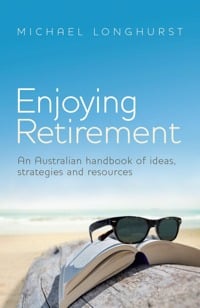In this guide
This is an extract from Enjoying Retirement by Michael Longhurst, published by Hachette Australia.
Michael Longhurst is a retired psychologist and leading authority in the area of adjustment to retirement. This extract presents findings from a research program that analysed the retirement experience of 200 Australians, and identifies eight specific factors that had helped those that had best adjusted to retirement.

The findings of the Retire 200 program – research with 200 Australian retirees
Some people thrive in retirement. Each day brings new joys and new adventures, with retirement being one of the happiest times of their lives. It is the time when the responsibilities of raising families have ended, when mortgages have been paid, and when it is their time to do their own thing.
For others, however, retirement can be a time beset with depression, fear, anxiety, and a sense of futility. It is as if all meaningful life has ended, and boredom has become the emotion of the day.
What are the differences between these two groups of people? More importantly, what do happy people do in retirement that unhappy people do not?
What to do in retirement
There are many factors that most of us can guess impact on satisfaction with retirement. For example, what sort of activities do people choose when they have retired? Do they sit around reading all the books they had wanted to read when they were too busy? Do they involve themselves in activities such as sport or voluntary work? Is doing all the fishing one has dreamt of doing the way to go, or is it better to lead a life with more structure and challenges?
Why did we retire?
In addition to what we do, it has long been thought that the circumstances surrounding why we retired have a significant impact on our emotional wellbeing.
Did we retire of our own free will, or were we pushed into retirement by forces outside of our control? How long does it take us to deal with the transition from full-time work?

Free eBook
Retirement planning for beginners
Our easy-to-follow guide walks you through the fundamentals, giving you the confidence to start your own retirement plans.
"*" indicates required fields
How do we remain physically and emotionally well?
Have we thought about how we are going to maintain our levels of fitness and mobility as we grow older? Will ‘having too much time on our hands’ lead to problems such as loneliness, depression or substance abuse?
What happens if we do not have enough money?
Given that even modest lifestyles require income, will we have sufficient money to enjoy our retirement? Having to watch every cent we spend so that we have enough money for food and shelter does not seem fair when we have worked hard all our lives. Yet, if provision is not made for retirement through superannuation or personal investments, such a lifestyle is a possible outcome.
Finding the answers through research
The objective of the research program was to build on earlier research from the United States and Australia to answer the above questions, and to identify the behaviours that differentiated well-adjusted retirees from their less happy peers. Having identified the behaviours of well-adjusted retirees, other retirees could then consider adapting their own behaviour to improve their satisfaction with life.
Who were the people on the Retire 200 research project?
The sample of retired people studied in the research comprised 100 men and 100 women drawn from rural and urban areas of each Australian state, and from a cross-section of pre-retirement occupations. Participants in the program were volunteers who were recruited to the research via radio and the print media, and from notices on bulletin boards of retirement organisations.
The Retire 200 research process
Designing effective social research is a complicated process. For example, if the research had comprised male retirees only, you would expect to get a one-sided view of what life in retirement is really like. As most retired couples will tell you, the roles of husband and wife often change considerably after retirement – any researcher who sought the views of just one gender would almost certainly miss the full picture. Unfortunately, much of the past research has focused on the male view of life in retirement and consequently has tended to present an incomplete view of retirement reality.
It is also important to ensure that the people being studied do not come from the same geographical area, or from similar incomes or occupations. If people across the general public are to draw meaningful conclusions that they can apply to their own lives, it is important that those participating in the research also comprise a representative sample of society.
2026 SMSF calendar
Our free calendar includes due dates for important documents plus suggested dates for trustee meetings and other strategic issues for your SMSF.
"*" indicates required fields
Differentiating those who were well adjusted to retirement from those who were not
As we mentioned earlier, the aim of the research was to identify behaviours that differentiated those participants on the program who had adjusted well to retirement, from those for whom retirement was a less happy experience. The degree to which a participant was regarded as ‘well adjusted’ to retirement was based on a combination of the following indicators:
- Their levels of retirement-related anxiety.
- Their levels of retirement-related depression.
- Their levels of retirement-related stress.
- Their levels of ‘comparative global satisfaction’–that is, their satisfaction with life in retirement when compared with life before retirement.
The eight major findings from the Retire 200 project
Eight areas were found to impact significantly on the degree to which participants adjusted satisfactorily to retirement.
- Being able to retire of your own free will
- Being able to retire at age fifty-five or younger
- Being financially independent
- Engaging in ‘Purposeful Activities’ for more than five hours per week
- Having someone on whom you could rely for emotional support
- Proactively maintaining your health through exercise, diet, and regular medical check-ups
- Planning for retirement – both financially and for an active lifestyle
- Receiving pre-retirement advice or education
We will now look closer at what each of these findings mean for those who have retired or who are about to retire.
Research Finding One: Being able to retire of your own free will – ‘Jumping versus being pushed’
The attitude with which we approach retirement usually relates to the degree to which we can control how and when we retire. Even when everything goes the way we plan it, the decision-making period is usually a stressful and emotional time. It can also be a frightening time for those close to the retired person, who may worry about how the changed circumstances will affect all concerned.
Retrenchment
We often see stories in the media about the effects of organisational mergers and downsizing. Most of these stories focus on the immediate financial hardships experienced by those who have been retrenched, and on their efforts to regain employment. However, for many older people, retrenchment also means involuntary retirement, and there is little doubt that many of those whose life plans are interrupted by forced retirement carry the effects of their pain well into retirement.
During the research program, a man was interviewed who had been retrenched from his job at the age of sixty-one due to an organisational downsizing. It was now three years on and he had long since ceased looking for another job. His investments were such that he really had no need to work for an income and now regarded himself as retired from the workplace. During his lifetime, he had seen the horrors of war, had run a business during tough economic times, and was a diligent and intelligent administrator for the firm that eventually retrenched him. Yet, despite having survived so many personal challenges, he was cut to the quick by the circumstances of his forced retirement. Frequently during conversations he would refer to his retrenchment as the time ‘they gave me the chop’ and many of those around him suspected that he never really managed to get this hurt out of his system.
Supercharge your retirement

Get pension and retirement tips and strategies with our free monthly newsletter.
"*" indicates required fields
As it turns out, the above reaction to forced retirement is very common. Naturally, there are many reasons which drive organisations to restructure with fewer staff. However, those on the receiving end often harbour the feeling that perhaps there was something lacking in their own personal make-up or work performance which caused them to be singled out. These feelings are not helped when those who have been retrenched later see colleagues who they regarded as less talented or less dedicated staying on with the organisation and appearing to prosper.
At a psychological level, involuntary severance from one’s livelihood can result in a sense of loss and the need to grieve in much the same way that we do following the loss of a friend or relative. If those who have been retrenched have also closely identified with their job, they may find themselves suffering more than those for whom work was just a means to an end.
Therefore, because of the significant potential for psychological stress due to forced retirement, it was predicted that those people who retired according to their own plans would be better adjusted to retirement than those forced to retire due to:
- illness
- the illness of a family member
- retrenchment, or
- business closure.
What the research found about the effects of forced retirement
As predicted, those retirees who were able to retire voluntarily reported lower levels of stress, anxiety and depression, and higher levels of satisfaction with life in retirement, than those for whom retirement was forced.
These findings were also supported by earlier Australian research in which retirees who had retired voluntarily experienced significantly lower levels of stress, anxiety, depression and bad health than those who were forced to retire. Other studies have also found that retiring according to one’s plans increases the likelihood of satisfaction with the experience of retirement.
Given the present trends of restructuring and merging organisations, the above findings are disturbing. The increasing moves to flatter organisational structures, lower staff numbers due to technology, and the outsourcing of business services are resulting in increasing numbers of people being forced to retire against their will. Consequently, those retirees who find themselves forced to retire because of health issues, or due to organisational restructure or closure, need to be aware that they may be at risk from emotional health problems.* They should also be encouraged to seek counselling if these problems subsequently affect their lives.
*Research into organisational stress has indicated that those senior managers who make the decisions regarding which people are to be retrenched can themselves experience stress and anxiety that may continue for many years. Part of their stress is attributed to their inability to explain to those who were retrenched that the ‘hit lists’ often had nothing to do with the individual performance of the employee. One former manager on the Retire 200 research stated, ‘I sometimes wished that I could show some of my retrenched colleagues how much thought and agonising took place before we arrived at our decisions. I am sure it would have helped soften the blow for many of them!’
Manage your retirement savings with confidence – for free

Get practical guidance from independent experts to help you make the most of your finances in retirement with a free SuperGuide account.
Find out moreResearch Finding Two: Being able to retire at fifty-five or younger – The impact of our age at retirement
Anecdotal evidence has long suggested that most of us hold strong views concerning our preferred age of retirement. A survey, conducted by the author just before the Retire 200 research commenced, indicated that most people presently regarded as ‘pre-retirees’ (that is, aged forty-five to fifty-five), wished to retire as close to age fifty-five as was financially possible. Only a few on the survey indicated that they wanted to work until the traditional retirement age of sixty-five, with most people stating that only dire financial necessity would drive them to work past the age of sixty-five.
Interestingly, many of those preferring to retire at age fifty-five modified their definition of retiring to mean ‘retiring from their present job or employer’. This large group of people held the view that retirement would simply signify a change of occupation. They could then embark on activities of their own choice such as voluntary work or part-time work in a low-stress environment, or starting their own small business.
What the research found about the impact of the age at which we retire
Following the results of the preliminary informal survey, it came as no surprise that those people who were able to retire at age fifty-five, or earlier, were associated with lower levels of anxiety than those retiring later. These findings suggest that those people who can retire at age fifty-five should at least consider this option, providing, of course, that other aspects of their lives – such as their financial preparedness – make this a viable option.
Why those who retired early chose to do so
First, many people told stories of their father’s generation of retired men who had worked to the age of sixty-five only to die a short time later. These people described themselves as haunted by the memories of their hard-working relatives who had passed away just as it was time for them to relax and do what they liked.
Second, others told stories of their fathers who were so firmly committed to the work ethic, and to their need to perform the role of provider, that when it came time to retire they simply could not relax. It seemed that it was impossible for them to accept that it was now okay to do what they liked with their day. Consequently, for many of them it was more stressful to relax than it had been to work hard, even where their previous occupation had been intrinsically unsatisfying.
Finally, many people found retiring at age fifty-five appealing because it allowed them to embark on chosen activities and personal challenges while they were still young and healthy enough to do so. Many of these people told stories of their parents or relatives who had planned a trip overseas or around Australia at age sixty-five only to have to cancel their plans because of the unexpected ill health or death of one partner.
At a social level, the above results appear to hold a double-edged sword. On one side, those retiring early from full-time work free up jobs and promotions for younger people still in the throes of raising families and paying off mortgages. Moreover, early retirees also have significant contributions to make to society in the form of voluntary work.
On the downside, it is likely that the trend away from lifelong employment will result in people being employed in a variety of short-term contracts and consultancies. With this trend likely to continue, only those who are well organised will commence and maintain forced savings programs, including superannuation and personal investments, required to fund a comfortable retirement. Furthermore, it is becoming increasingly unlikely that the present age pension can continue to be taken for granted by the growing pool of baby boomers, funded as it will be by shrinking numbers of those in full-time employment.

Free eBook
Beginners guide to the Age Pension
Learn how the Age Pension is assessed, and how to apply.
"*" indicates required fields
Research Finding Three: Being financially independent – Comfort versus subsistence
At an intuitive level, most people would predict that those who can live off their own investments or superannuation are probably going to be more satisfied with life in retirement than those who have to rely on a government pension.
What the research found about financial independence
The research findings indicated that people who were dependent on government pensions for their income experienced significantly higher levels of depression, anxiety and stress, and lower levels of satisfaction with life in retirement, than those who were financially independent. These findings also support those of earlier studies where poor financial status was found to be a predictor of stress and anxiety in retirement.
The impact of dependence on the government age pension
Income from the age pension was regarded by most as barely adequate to provide the basics of life. In most cases, only those who were completely debt free and prepared to live extremely simple lifestyles were able to live on the pension with any success.
CREATIVE ACCOUNTING
Living on the age pension forced people to become very creative when it came to reducing their living costs. Some people had almost turned the process into an art form and had developed a number of strategies for getting by. For example, one woman and her husband collected discarded supermarket receipts that had special offers on the back such as ‘two meals for the price of one’ at the local hotel. Having had their two-for-one dinner in the main lounge they would go to the gaming section, not to gamble but to finish their meal with the free coffees and after-dinner mints provided for the gambling patrons.
BEING IN DEBT ON THE PENSION
Those who found themselves on the pension while still paying off home mortgages were usually in a precarious financial position. Carrying debt into retirement occurred for any one of a number of reasons.
- Some had experienced a failed second marriage while on the rebound from the death of a lifelong partner. The resulting divorce then required them to refinance their home late in life to buy out their estranged partner’s interest in the house.
- A number of people had borrowed against the security of their homes to help adult children in trouble with drugs or personal debts, or who were trying to escape abusive relationships.
- Others had fallen into debt due to failed businesses where the family home had comprised the lender’s security.
SOCIAL ACTIVITY
Otherwise simple decisions to participate, or not to participate, in social events were complicated by lack of money. In a number of cases men complained that staying back ‘for a couple of beers’ after bowls or golf was out of the question. They simply could not afford it. One man described himself feeling like a child again having to ask his partner’s permission to spend a few dollars. Others found it embarrassing to have to give excuses for not attending social events because of their lack of disposable income.
ILL HEALTH
For those who became ill or infirm, financial dependency left them feeling frightened and vulnerable to what they felt were the whims of an uncaring health system. Relying on the public health system may not be such an issue when we are young; however, as we become older we may find ourselves suffering from a range of potentially life-threatening complaints such as hypertension, diabetes or heart disease. It is then understandable to feel threatened by the inability to nominate where, when, and with whom required medical procedures or advice are sought.
RUNNING OUT OF MONEY
A number of people described the fortnightly indignity of running out of money one or two days before pension day and being forced to subsist on rice or potatoes until the next pension payment was received. This situation was by no means rare and it is a sobering experience to listen to someone describe how demoralised they feel each time the money runs out. At a psychological level, the situation can be compounded where adult children who could and would provide assistance are blissfully unaware that their proud parent is suffering in silence.
VOLUNTARY WORK
The ability to contribute to society and mix with others through voluntary work was also denied to many people who were struggling to make ends meet on the pension. Voluntary work usually ends up costing the volunteer money in the form of fuel or fares and many could not afford these extra costs.
Research Finding Four: Engaging in ‘Purposeful Activities’ of more than five hours per week – The spice of life
It makes sense that those who keep themselves busy will fare better emotionally than those who lie around doing nothing. Similarly, if an activity has a purpose most people would predict that it would be more rewarding than just remaining active for the sake of ‘something to do’.
‘Purposeful Activity’ was the term used in the Retire 200 study to describe an activity that had a goal or purpose. For example, playing golf was not regarded as a Purposeful Activity regardless of what most golfers would argue! However, voluntary work in an opportunity shop to raise money for the Brotherhood of Saint Laurence, or working in a paid capacity to supplement retirement income, were examples of Purposeful Activities.
What the research found about the importance of ‘Purposeful Activities’
Involvement of over five hours per week in a Purposeful Activity, or a range of Purposeful Activities, was associated with significantly higher satisfaction with life, and with lower levels of depression and stress. Participating in Purposeful Activities was a behaviour that retirees either planned for before retirement, or sought after retirement due to boredom. Therefore, those retirees who found their lives lacking variety or rewarding activities could choose to commence Purposeful Activities virtually at any time during their retirement years.
Eighty-six per cent of those on the Retire 200 program regarded involvement in a Purposeful Activity as very important to their satisfaction with life. The beneficial effects of involvement in Purposeful Activities continued to show a positive trend even where these activities exceeded thirty hours per week. These findings imply that many of the social and emotional rewards previously provided by the workplace can also be provided by Purposeful Activities in retirement. This notion is supported by the fact that income was cited as the sole motivation for having a Purposeful Activity by only two per cent of participants.
Research Finding Five: Having someone on whom you could rely for emotional support – Availability of ‘a shoulder to cry on’
‘Keep emotionally close to your family – some people forget their family while they are traipsing around the country.’
It was decided to examine the level of emotional support that retirees could access should they require it. The basis for investigating availability of emotional support was twofold:
- For many people, the workplace provides a source of informal counselling, where workmates discuss events going on in their lives and provide each other with emotional support during times of crisis. On retirement, these social networks disappear virtually overnight.
- Second, as we get older, the higher the statistical probability becomes that we will suffer from ill health, or that our partner or a friend will become ill or die. When any of these events occurs it is important to have access to people to turn to for extended emotional support.
What the research found about the availability of emotional support
Those with access to emotional support reported significantly lower stress and higher levels of satisfaction with life in retirement. This finding also supports those of earlier research in which availability of emotional support from family or others was associated with lower levels of anxiety and depression. The findings indicate that retirees should maintain their relationships with family and friends where this is possible. Those who find themselves without access to such emotional support are advised to compile a list of alternative resources such as those provided by religious institutions, municipal counselling services, or telephone-based crisis-referral organisations such as Lifeline.
Research Finding Six: Proactively maintaining your health – Self-promoted health activities
While it is clear that poor health is an important factor influencing satisfaction in retirement, there had been very little research examining the effect of proactively contributing to one’s good health. Consequently, self-promoted health activities were examined for their effect on satisfaction with retirement. Health activities were segmented into three subsets, namely, (i) exercise, (ii) diet, and (iii) annual check-ups.
What the research found about self-promoted health activities
First, those who exercised daily were associated with significantly lower levels of stress when compared to those not exercising, or exercising less frequently than daily. The link between exercise and stress reduction is well known and the present findings also indicated that good physical health was associated with lower stress. Apart from the clear emotional benefits of reduced stress, there are also well-established links between high levels of emotional stress and heart attack and stroke. This is an important implication, as many participants reported that their greatest health-related fears concerned heart attack, stroke and the onset of dementia.
Second, those who moderated their diet by either the amount or type of food consumed were found to experience significantly lower levels of depression than those who did not attend to dietary matters. This is consistent with those findings of research into depressive illnesses where it has been found that those who attempt to take even very small steps to control their situation improve faster than those who do not.
Finally, those who regularly attended to all three of the subsets of health maintenance (exercise, diet, annual check-ups) were associated with significantly lower levels of depression than those who attended to only one or two subsets.
Research Finding Seven: Planning for retirement – Finances and lifestyle
When it comes to planning behaviour, we generally fall into one of two types of people:
- Those who are naturally goal and strategy-oriented and who are therefore more likely to have action plans in place to meet their goals.
- Those who are naturally unplanned and who prefer to live life as it comes.
What the research found about retirement planning
Those who planned for their retirement were associated with significantly lower levels of self-reported stress, anxiety and depression, and higher levels of satisfaction with life in retirement when compared with those who did not plan.
Interestingly, the research findings indicated that it is not just financial planning that is relevant: it is also important to make plans for the type of lifestyle you wish to have. For example, many of those on the Retire 200 program observed that planning for activities well before retirement had made their transition to retirement much less of a jolt. Their rationale was that if you became involved in a number of activities before you retired, there were more common factors linking your ‘pre-retirement life’ to your life in retirement.
Research Finding Eight: Receiving pre-retirement advice or education – The benefits of a sneak preview
People commencing retirement usually do so having very little objective knowledge of what that lifestyle will entail. This is partly due to the fact that there has been very little accurate information on the effects of retirement lifestyles readily available. Consequently, when people commence retirement they often do so with the expectation of a lifestyle that may have very little to do with reality.
Given the lack of available information, people who are seeking information about retirement have had little choice but to turn to friends and relatives who have retired to try to get a snapshot of life in retirement. The problem with this method is that people’s values and expectations vary widely. What may be a satisfying retirement lifestyle for one person may turn out to be unsatisfactory for another.
For others, their perception of life in retirement may be based on a rosy existence that is predicated more on escaping from the workforce than it is on looking forward to an exciting new phase in life. It was therefore decided to examine what effect receiving formal pre-retirement advice or training would have on perceptions and subsequent emotional wellbeing.
What the research found about the effects of receiving pre-retirement advice or education
The research findings indicated that those who sought pre-retirement advice, or who attended pre-retirement training programs, reported significantly lower levels of depression than those who received no pre-retirement advice or training.
These findings support those of earlier research where:
- There were significant relationships between attendance at a pre-retirement seminar and subsequent wellbeing in retirement.
- The amount of exposure to pre-retirement advice was positively
correlated with retirement satisfaction, and - Receiving pre-retirement education was associated with
significantly more positive attitudes to life.
Extracted from Enjoying Retirement by Michael Longhurst, published by Hachette Australia. Out now. $29.99.


Leave a Reply
You must be logged in to post a comment.